Do you have itchy, irritated skin caused by swimming? You may be suffering from chlorine itch. Learn how to reduce the effects of pool chemicals (including chlorine) on your skin and how to naturally protect swimmers.
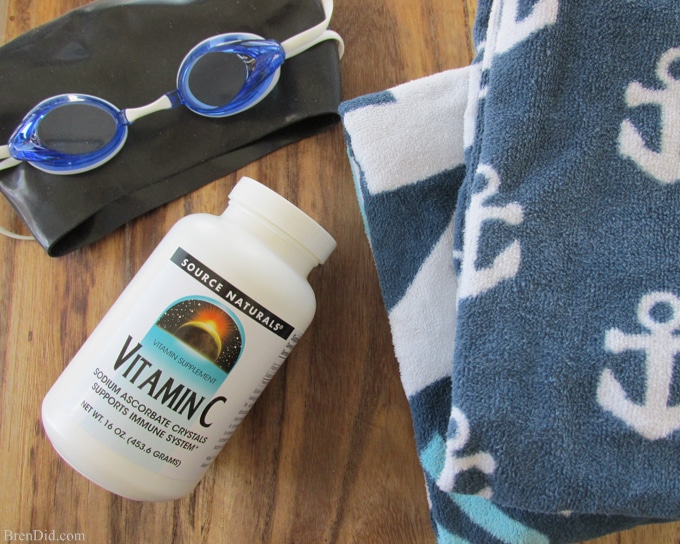
Chlorine itch is the term used for the sensitive itchy skin you sometimes develop after swimming in a chlorinated pool or hot tub. The itch may be caused by a sensitivity or allergy to chlorine… or just plain over exposure to chlorine.
Luckily there are easy ways to reduce the effects of pool water chemicals (including chlorine) and naturally protect swimmers.
How Chlorine is Used in the United States
Pools and hot tubs in the U.S. are treated with chlorine to prevent illnesses caused by germs and bacteria found in water. Municipal water systems are also treated with chlorine, EPA guidelines allow up to 4 ppm of chlorine in drinking water (tap water).
We are lucky to have a safe water supply in the United States, but it is important to understand the undesirable effects of chlorine in our water as well.
Why You Should Protect Your Skin from Chlorine
My kids swim year round for swim team and recreation. I love that they are interested in a sport they can participate in whether they are 5 or 95. But spending several days a week in the pool can wreak havoc!
-
- Swimming in a chlorinated pool means exposure to known skin irritants that can cause skin to become dry and itchy.
- Research suggests that chlorine in swimming pools can increase rates of asthma, cancer, and skin/throat irritation.
- When chlorine mixes with water it forms hypochlorite, a bleaching agent that causes fabrics to fade (Ever notice how faded swimsuits get?).
Chlorine Byproducts
In addition to direct risks, chlorine reacts with organic matter to form chemicals known as trihalomethanes, commonly called “disinfection byproducts.” These dangerous byproducts (including chloroform) are released when chlorinated water reacts with organic matter from swimmers such as sweat or urine. You can read more about trihalomethanes in the EWG 2013 Tap Water Guide.
How to Naturally Protect Swimmers from Chlorine
I hate exposing my kids to dangerous substances but love the enjoyment and exercise they get from swimming. What’s a parent to do?
I’ve decided to reduce chlorine exposure as much as possible and, as Dory might say, “Just keep swimming!”
Five non-toxic ways to naturally protect swimmers from chlorine:
- Wear a swim cap and goggles.
- A tightly fitting swim cap and pair of goggles prevents the chlorinated water from further reaching the hair and eye area.
- Get wet before swimming and rinse off afterward.
- Wetting skin and hair reduces the amount of chlorine you skin and hair can absorb.
- Create a layer of hair protection.
- Spray damp hair with an All-Natural Hair Detangler and Protectant (see my easy recipe at end of post).
- Form a skin barrier.
- Apply a thin layer of natural oil (i.e. avocado, almond, jojoba, argan, or coconut oil) to skin. This light barrier further prevents the amount of chlorinated water your skin and hair can absorb. Smooth the oil on while skin is damp to protect without becoming a greasy blob.
- Use a natural balm to protect lips. My kids use my all natural Healing Dry Skin Balm on their lips, knees, elbows and other dry spots.
- Treat skin, hair and swim gear with a vitamin C solution.
- Vitamin C naturally neutralizes chlorine! I make After Swim Chlorine Neutralizing Spray. See the full recipe below.
How to Use Vitamin C to Neutralize Chlorine (Vitamin C Dechlorination)
Both ascorbic acid and sodium ascorbate (two common forms of vitamin C) will neutralize chlorine (neither form of vitamin C is considered a hazardous substance) according to the USDA.
1. Ascorbic Acid – The chemical reaction of ascorbic acid with chlorine is:
- C5H5O5CH2OH + HOCL → C5H3O5CH2OH + HCl + H2O
- Ascorbic acid + Hypochlorous acid → Dehydroascorbic acid + Hydrochloric acid+ water
2. Sodium Ascorbate – The reaction of sodium ascorbate with chlorine is:
- C5H5O5CH2ONa + HOCL → C5H3O5CH2OH + NaCl + H2O
- Sodium ascorbate + Hypochlorous acid → Dehydroascorbic acid + Sodium chloride + water
How to Make After Swim Chlorine Neutralizing Spray
- Directions: Mix 1/2 tsp sodium ascorbate with 4 ounces of distilled water. Use within 24 hours. (The solution breaks down and looses effectiveness after 24 hours.)
- Use: Generously spray After Swim Chlorine Neutralizing Spray all over immediately after swimming. The vitamin C neutralizes the chlorine.
*Tip: Add a teaspoon of sodium ascorbate to an empty 8 oz water bottle and bring it to the pool. After swimming take the bottle to the shower and fill with water, shake to combine then dump over your hair and body.
Vitamin C Shelf Life
Both ascorbic acid and sodium ascorbate are affordable and have a shelf life of at least one year in a dry form (stored in a cool, dark place). However, once it is mixed into a solution, the vitamin C degrades in a day or two. Mix just enough solution to use each day.
After Swim Chlorine Neutralizing Spray Cost
I currently use Source Naturals Vitamin C Sodium Ascorbate Crystals to make my after swim spray. It cost around $15.00 for 16 oz (approximately 189 days of After Swim Chlorine Neutralizing Spray at $0.08 a day). A similar natural product costs $11.95 for 6 ounces (about 12 days of spray).
Chlorine Removing Post Swim Routine
We follow a simple spray and shower routine to naturally protect ourselves from chlorine damage.
- After swimming spray off with After Swim Chlorine Neutralizing Spray (recipe above) then change and come home to bathe.
I also use a few simple tools to remove chlorine from our water at home:
- Carbon water filters in all of our home showers to remove chlorine.
- These screw on shower attachments cost around $30.00 and use $12.00 replaceable filters that last for up to 6 months. (We have been very happy with the results. Even my father, who is allergic to chlorine, was able to shower without developing itchy skin.)
- Bonus, the filters help keep my shower mold & mildew free and I have to do less scrubbing when cleaning!
- The shower attachments screw on with no special tools, we even take them with us when we move.
- For extra protection: Mix vitamin C into shampoo or body wash to neutralize chlorine or add a few teaspoons of vitamin C to the bathtub.
- You can also use Vitamin C tablets in your bathtub.
Protecting Swim Gear
This routine has helped reduce the amount of fading and breakdown in our swim suits:
- Rinse swim suits in a bucket of water with a teaspoon of sodium ascorbate after each use.
- Pour the whole bucketful (water, suits, and all) into the washing machine, add a scoop of non-toxic detergent, run the washer on the delicate cycle, then hang suits to dry.
- When I’m feeling lazy I toss the suits into the washer with a few teaspoons of sodium ascorbate and detergent then run the delicate cycle.
Protecting Hair From Chlorine
You can protect your hair from chlorine three ways:
- Wet hair before each swim. Wet hair can absorb less pool water.
- Apply a natural product that helps prevent chlorine absorption.
- Wear a tight swim cap.
All-Natural Hair Detangler and Protectant Recipes
- DIY Hair Detangler and Protectant with Essential Oils
- 1 Tbsp Vegetable Glycerin
- 1/2 cup Distilled Water
- 3 drops Argan Oil
- For Rosemary Mint add: 5 drops Peppermint Essential Oil and 5 drops Rosemary Essential Oil
- For Fresh and Floral add: 5 drops Rose Absolute Essential Oil and 3 drops Ylang-Ylang or Lavender Essential Oil
Combine all ingredients in a glass spray bottle. Shake to combine and shake again before applying. Use a few light sprays as a detangling spray after washing or apply generously to damp hair before swimming to protect hair.
2. Easy Hair Detangler and Protectant
Combine 1 oz of natural conditioner (use your favorite non-toxic conditioner) with 8 oz of distilled water. Combine all ingredients in a spray bottle. Shake to combine. Use a few light sprays as a detangling spray after washing or apply generously to damp hair before swimming to protect hair.
I hope these tips and tricks help you naturally protect your hair, skin, and gear so you can keep swimming!
Like my natural beauty and body care tips? Sign up for my free newsletter and never miss a thing.


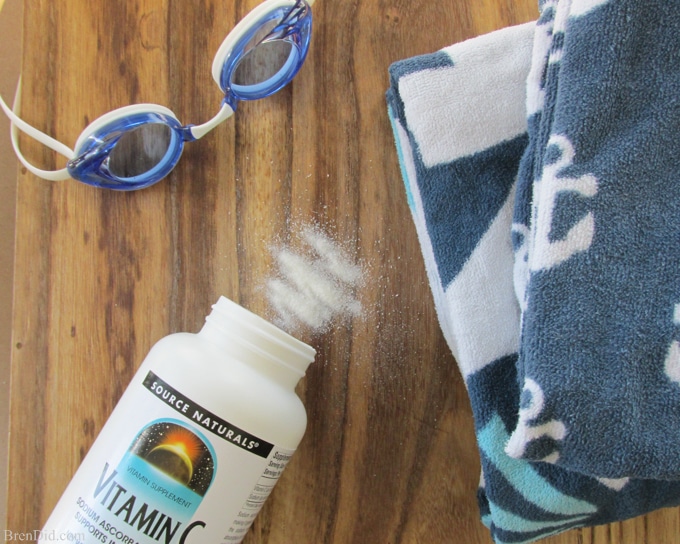
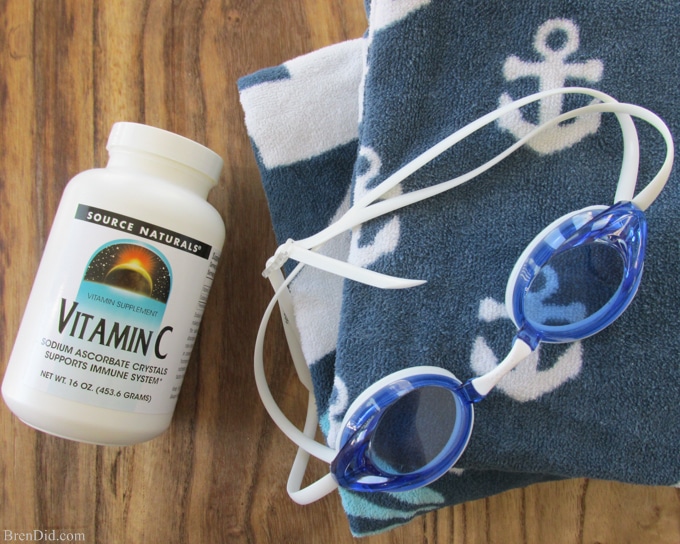
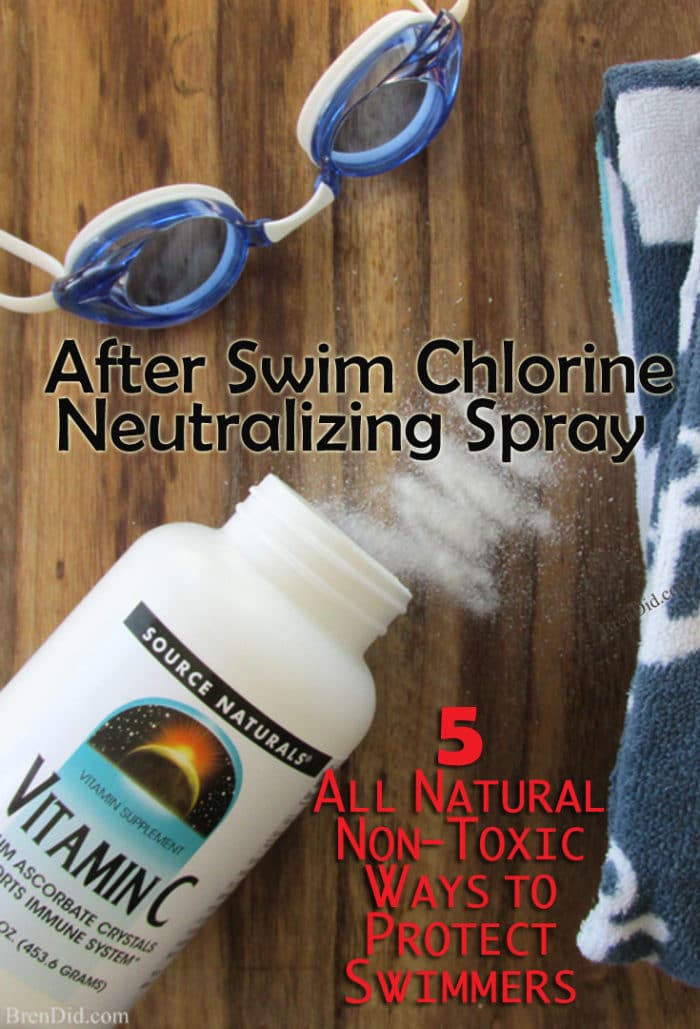

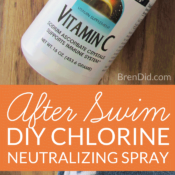
Liz
Thank you so much for these tips! There’s a community pool less than a block from me that I rarely use, in part because of the damage the chlorine does or can do to my skin and hair. I also color my hair and can’t seem to manage a swim cap without it pulling or even ripping out some of my super-fine hair — so I really appreciate the recipes for the detangler/protectants to use ahead of time. I’ll also *generously* douse my hair with After Swim Chlorine Neutralizing Spray after swimming.
But I am open to any other “special” tips you might have for color-treated hair!
Thanks for all you do!
Helen R
Hi I am going on holiday to Turkey in a few weeks obviously it will be very hot. I became sensitive to chlorine a few years back, due to Covid we have not been away for the last couple of years, but my previous holidays have been spoilt by the horrible itchy rash that spreads over my body. Is there anything I can do before going away to help? I have read to shower before and after swimming in the pool, but then a little confused regarding the Vitamin C spray. Do I shower, spray then shower again? then do I need to re-apply sun cream? or do I just shower each time I dip which could be several times a day and then apply vitamin C spray at the end of the day?
Bren
We just spray, dry, and get dressed! I would experiment and see what works best for your skin.
Jennifer DuPoux
Can you leave the spray on & not shower until you get home in a couple hours? My boys go to summer camp & swim at camp. There’s no time to shower.
Bren
Yes, you can shower later. I would recommend doing a spot test on a small spot of skin just to be sure as all kids are different in their skin sensitivities.
Veronica
Just curious – for the hair spray recipe… does it need to be a glass bottle or will plastic work ok? Does it react to plastic in some way? Also, does the shower filter you recommend also filter out fluoride and other toxins like phthalates and heavy metals?
Thank you so much, by the way, for taking the time to create this website and share these healthful useful tips!! May God bless you richly 🙂
Bren
Veronica, I have not had trouble with the spray reacting to plastic when I’ve used a plastic bottle with my kiddos. The shower filter I use says, “Help reduce chlorine and its vapors, damaging chemicals, heavy metals, minerals and impurities from your shower water, reduce exposure to radioactive Iodane, Radon and Hydrogen Sulfide, Discourage the growth of mold, mildew and algae, Improve water’s pH Balance.” It does not specifically mention fluoride and phthalates. I’d love a whole home water filter but right now we’re making due with the more affordable version. Hope this helps!
Liz
Thanks for that question, Veronica! We’re not allowed to bring glass of any kind to our community pool so I was curious about this, too. And thanks to Bren for the answer!
AA
Hi Bren, how much Vitamin C should I add into my shampoo and body wash? I bring 50ml bottle of each when I go swimming.
Bren
I don’t usually mix the vitamin C with my shampoo and body wash so you’ll have to do a little experimenting to see the results. I would start testing a small travel size bottle of each product, add 1/4 tsp of vitamin c, see how you like the results, and then increase or decrease the vitamin c powder. Hope this helps!
JB
Hi Bren…I swim 2 hours every week day and burn and itch terribly when I get home. I’ve tried rubbing down with coconut oil before I swim and just rinse off without soap when I get out of the pool but it doesn’t help. If I try the mix you mentioned should I spray it on right after my swim and how long should I leave it on before I rinse off?
Thanks
JB
Bren
I would spray it on right after you swim. The reaction with chlorine is immediate so you shouldn’t have to leave it on too long, just a few minutes is what we do!
Subhadra Hemphill
I use raw sesame oil before swimming, which works good.
Michael Harper
The cancer risk you mentioned is highly speculative and no study has concluded chlorinated swimming pools cause cancer.
Good tips here though, especially getting wet before going in
Veronica
True, but it’s pretty much common sense, eh?
Jeannine
Hi. Thanks for posting this. I bought the wrong Vitamin C powder and came home with ascorbic acid. Can I use this? What difference will it make?
Bren
Jeannine, I’ve never made it with ascorbic acid but according to the science (both neutralize chlorine), it should work. Let me know if you try!
Stefanie
Do you rinse the vitamin C spray off after it sits for a minute before putting clothes on??
Bren
My kids rinse it off pretty quickly (they’re impatient). You can experiment and see what works for you.
Michele
Thank you very much for this truly helpful information. To this end, while I do spray down completely and shower after swimming, is there any benefit to spraying again lightly after showering- as I am still experiencing some slight residual itch. I thank you for any advice or insight you may have.
Bren
It may help as there is chlorine in city water…. as you’re getting a second dose when showering.
jessica
hello!
I have a saltwater pool. I get extremely itchy afterwards for a couple days. will this wash help ?
Bren
Unfortunately, it only helps with chlorine, not salt.
Shirley Briggs
No experience or knowledge of saltwater pools, but could it be a PH imbalance? I think too high alkanity can cause an issue with itchy skin and eyes – or I may have remembered that wrong!
Richard
I learned from a friend about vitamin C wash after swimming in a chlorinated pool, It really works great and I don’t have to give up the great exercise I get at the Y’s warm water pool. I’m 73 and water exercise saves my knees and keeps me mobile.
Bren
It works great, doesn’t it?!?!
bruce graham
very very helpful information. thanks so much
fab
Hi Bren,
Can i put this all over my body including nether regions and face?
Also should I apply this right after I get out of pool, leave it on, then shower at home?
Bren
I would spot test before using on tender areas! I apply right after pool then us a vitamin c filter in the shower at home.
Sarah
Thank you so much for all the great tips!
Just wondering when adding the sodium ascorbate vit C compound to shampoo and body wash, how much do you put in to say a full bottle?
Bren
I just add a sprinkle to the shampoo in my hand so it doesn’t react in the bottle.
Melissa
What do if my kiddo is already wearing sunscreen (ThinkBaby)? Do I still spray the vitC on top of that after swimming or do I need to wash off the sunscreen first? If I got her skin wet prior to chlorine exposure, should I wet it before or after I apply the sunscreen?
Bren
Melissa, I would apply the sunscreen as directed (usually to dry skin). It will form a barrier. I would use the vitamin C spray when you are done swimming for the day.
Deepta
Bren, a very informative post! I already got Sodium ascorbate crystals after reading about this brilliantly simple method :). Could you clarify one thing for me- does the water need to be distilled or will it work with the regular shower water at the pool? Thank you!
-Deepta
Bren
Distilled water will keep the vitamin c from reacting with any chlorine in the tap water before you use it but either will work!
Joel
My top of my feet burn after being in chlorinated pool …after 5 minutes. What elce can I do besides pre washing, and using vaseline as a layer of protection….the itch or burn is very painful…going to try some vitamin E capsules for the after burn …
Bren
I would suggest the vitamin c spray and a doctor visit to rule out a chlorine allergy!
Joan
Ascorbic acid is about half the price of sodium ascorbate. Will it work as well?
Bren
Both ascorbic acid and sodium ascorbate are supposed to do the same thing, BUT I have only used sodium ascorbate so I can’t personally promise equal results with ascorbic acid. Let me know if you try! -Bren
roberta gould
This is great BUT PLEASE CLARIFY…SINCE I SHOIWER IMMEDIATELY AFTER SWIMMING, SHOULD I APPLY THE VITAMEN CA SOLUTION YOU DESCRIBE AHD WHICH I MAKE BEFORE I GET IN THE SHOWER OF AFTER…AS SHOWER IS ENDIED
Bren
Your choice. I spray my kids before they shower. I make the spray before we head to the pool.
SHEILA
Bren, i’m so happy I discovered your website! I’m going to try using the suggested prepping the body before and after enjoying daily chlorinated pool exercises! 🚿Thank you thank you thank you
Bren
Thanks Sheila! Hope it helps!
Chloe
Hi Bren! I’m a swimmer and recently developed chloring rash. Could i use plain vitamin c tablets instead of sodium ascorbate? Also do you have any tips on relieving the itch? Thank you
Bren
I would read the tablets to see what they are made from… both ascorbic acid and sodium ascorbate will neutralize chlorine. You can then dissolve the tablets in water to make the solution. To relieve the itch you could try a moisturizing bath with oatmeal or try using a natural oil as lotion. I would try the tips for removing chlorine from your shower/bath water too. Good luck!
Michele
Any suggestions for protecting our girly parts from chlorine. I go to aqua fit classes a few times a week. It’s a better option for me for my knees. I too get itchy and will try your spray. My doctor explained it as swimming with your mouth open with respect to our girly parts and wondered if there was a way to protect that region. I’ve tried using coconut oil and wondered if that would do anything.
Bren
I’m not sure about that one, sorry!
Emily
Hi… I’m confused about the suggestion to use natural products as a protection on your skin and hair. Aren’t the nasty byproducts created when chlorine comes in contact with organic materials? So wouldn’t applying organic/natural products to your hair and skin before swimming actually make the situation more toxic? I might be missing something, so please explain. Thanks!
Bren
Emily, the natural products are used to create a barrier so the by products are not coming into direct contact with your skin.
Aurora
Vitamin Shoppe has the powder calcium ascorbate. Is this the same as sodium ascorbate?
Bren
It is my understanding that calcium ascorbate is a combination of calcium and ascorbic acid. Sodium ascorbate is a combination of sodium and ascorbic acid. I would check with your vitamin seller to see if they can be used the same way. I have only used the Sodium Ascorbate.
aurora
thank you, I will
Liz
I can only find calcium ascorbate as well when I’ve looked for powdered vitamin C. Did you have any luck with it?
Wilfredo
Hi-
My name is wilfredo, first of it i’ll began by saying, I have 2 kids swimming 3 times per week minimum, 1 an-half hrs every time, we belong to a swim team for the last 7 years, and I have been swimming for the last 3 years in a 25 meter pool and sometimes a 50 meters for 2 time per week each is 1 hrs, all this pools are full of chlorine, but we love the sport, i also have a whole house filtration system to remove the chlorine and fluoride.
I have tried every shampoo and nothing works,
I take a long shower after swimming for one hour , once my skin is dry, i have a very bad smell to chlorine, even the next day, I worry about my kids how bad it could be,
In the future,
The smell never goes away from swimming gear, desperately looking for a solution I came to this site! I am happy that I am about to join you guys!
Question for anyone of you?
After you guys have try this, is there more effective method to use this or mix?
Have anyone have try to mix
The (Sodium Ascorbate Powder with coconut oil or similar) or Is that a bad idea?
Your feed back is very important.
Thank you!
Bren
Hi Wilfredo! I understand the chlorine smell issue. I would try the Sodium Ascorbate Powder mixed with water after you swim. You can mix it in a spray bottle or add a few spoonfuls to a bath so you can wash is chlorine free water. I think you will see a big reduction in chlorine smell after a few days. Good luck!
Wilfredo Villanueva
Hello Bren!
Thank you for the reply, I am pitting 2 full spoons of sodium ascorbate on a plastic bottle when kids come out of the pool they fill in with water giving a good shake,-and pore in the head down and make sure they cover the entire body, WORKS EXCELENT, I Swim 2 days per week and I am using it.
Thank you!
Bren
🙂
Enrique
Thank you so much for this information! It works incredibly well, from the first use you can already tell the difference! You saved my skin and my swimming! <3
Bren
I’m so happy to hear that you are having great results, Enrique!
Secilia Marino
Looking forward to using the vit. C spray/rinse
My questions is: about wetting skin before pool AND using oil before? In what order? Wet then oil self? oil self then wet before entering pool?
Before going in pool, I always wet hair, add a tiny bit of “leave in conditioner” and put a swim cap on. I also often cover at least my face and neck with coconut oil, sometimes my whole body when I have time.
I only rinse rinse rinse afterwards. And use conditioner on hair. When I shampooed and soaped every time, my skin and hair suffered.
I swim most days 35 min in water, and always itch, it is getting worse, I am getting older and more sensitive, or they are using more stuff in water. When water is warmer, the itch is worse.
Looking forward to making and using Vit C and investigating the shower filter.
Bren
I would get wet and then apply the oil. A thinner oil like almond or avocado oil is easier to apply when damp.
Roberta Hubbard
Thank you so much for this great article, it is just where I am at. I was just diagnosed with hyshimoto thyroid disease, and now swimming might have to go. But I want t protect my lungs from breathing the chlorine as well. Thanks for this info, just what the doctor ordered. 🙂
Bren
I’m so glad you found it helpful, Roberta!
Terry
1. Ascorbic Acid – The chemical reaction of ascorbic acid with chlorine is:
C5H5O5CH2OH + HOCL → C5H3O5CH2OH + HCl + H2O
Ascorbic acid + Hypochlorous acid → Dehydroascorbic acid + Hydrochloric acid+ water
Hydrochloric Acid???!!! That can’t be good. I see you use Sodium Ascorbate in your recipe, but don’t explicitly state whether or not Ascorbic Acid Should or shouldn’t be used. I would think this is a bad option with the byproduct of Hydrochloric Acid… no?
Bren
You definitely use the one you feel comfortable with. I use Sodium Ascorbate.
Cynthia
Do you wash the swimsuits every day they swim?
We did learn the hard way that you need to rinse out clothing that you spray with the C or it can stain it. So we make sure to rinse off the skin too just in case it leaves an issue.
‘
Bren
Yes, I wash them almost every time they swim using cold water and a tiny big of detergent then hang to dry. It helps with fading and seems to make the suits last longer.
raymond
Hi Bren,
You provided directions on how to make an after swim chlorine neutralizing spray using sodium ascorbate, but how much ascorbic acid would you use if one cannot find sodium ascorbate?
Bren
I would use an equal amount. Let me know how it works for you.
Trinity's Aunt
My niece was diagnosed with a reaction to chlorine. She says her skin still itches even after the use of cream prescription. Any helpful hints on what to use to help with her discomfort?
Bren
My dad is allergic to chlorine so he tries to avoid it: no pools, etc. If bathing in chlorine treated water try adding sodium ascorbate to each bath (I use use Source Naturals Vitamin C Sodium Ascorbate Crystals) and/or use a filter on the shower head (I use these carbon water filters in all of our home showers to remove chlorine).
Carol
If the kids shower (shampoo, soap & water, not just a rinse) at the pool immediately after swimming, is the post-swimming spray still necessary, or just use the sodium ascorbate rinse in the shower, then shower as usual? Thanks!
Bren
I like to use the sodium ascorbate rinse in the shower (either before or after they shower) to neutralize the chlorine because 1) the shower water also contains chlorine and 2) a shower alone never seems to get rid of all the chlorine smell in thieh hair/swim suits. Thanks for the great question!
Janie Harvet
Can you leave the vitamin c spray on are should you bathe it off?
Bren
You can leave it on. We generally shower afterward since we have just been in the pool.
Janie Harvey
I shower first and after spray on the vitamin c and leave it on. I think it might be turning my hair and fingernails yellow. Have you heard of this?
Bren
I have not heard of this, you could try using a shower filter that removes chlorine if your concern is chlorine in the shower water. They are affordable, we use them in all our showers.
Linda
6 grams of L-Ascorbic acid powder in a teaspoon
i bring 1 tsp of vitamin c powder in an empty water bottle to the shower, fill with hot water while I’m rinsing, dump most of it through my hair and gear, shampoo with a jr ligget shampoo bar, then dump the rest like an apple cider vinegar rinse without the stink to close my cuticle and prevent frizz. no conditioner needed. Chlroine gets deneutralized on contact so there’s no waiting around- rinse it out. Same for the shampoo bar, the jr ligget says wash and rinse. (I used to double wash, double condition, leave in, detangle, etc). I put a bit of the shea butter concoction described below in from the ears down onto damp towel dried hair.
Longest hair and fastest showers in my life.
I was doing the wait till you get home to shower again and got fungus from being wet all day – thick hair
also straight coconut oil works as a deodorant – who knew?
Got rid of all of the lotion in the house, using a 5 Tbsp shea butter mixture beat for 10 mins with 1 tsp argon oil, 1 tsp jojoba, 1 tsp coconut and 1 tsp olive
works for the hair, face, lips, feet
fantastic
the oils and whipping make shea butter spreadable, tried cocoa butter and couldn’t take the smell
hope this helps someone, swimming makes life better- friends makes life worth it
Bren
Thanks for the great tips, Linda! It takes a village to be a swimmer. 🙁 I can’t wait to try the shea butter mixture. I agree, cocoa butter smell is too strong for me too. Have you tried mango butter? It has even less smell than shea butter. I love it!
Mark
Thanks Bren! I used a cooling pool that had an abundance of chlorine in it, much to my dismay. I started itching that night and it continued into the next day. I found your article and used the Vitamin C crystals in water and it gave me a lot of relief. I think my skin was already burned a bit from the chlorine, so it took until that evening for the itching to subside. Thanks again.
Bren
I’m so glad it helped, Mark!
Yaoyao Fu
Great DIY! As an avid swimmer, chlorine really bothers me. Thanks for the creative idea! I shared it to my fb as well. 🙂
Ceci
Great information! As an Arizona mom, being in the pool in the summer is given for my kids. I’ve always hated the massive chlorine exposure, but your tips & recipes will help! I’m going to give them a try! Would you mind if I “report back” later this summer with a post on my blog? I would definitely link back to this post! Thanks so much!
Bren
Thanka Ceci! I’d love to hear back on your results!
sarahkempson
Thank you Bren for this post (I have not been able to browse through your webpage much yet, but it seems to be very helpful). In regards to swimming (as I have grown to love the sport & exercise over the last 2-3 years), I have really sensitive skin (still in the process of trying to find out if I have an autoimmune disorder, or just certain environmental allergies). My question is, you mention the need to use the Chlorine Neutralizing Spray within 24 hours. Have you found this to be the case? For what reason? Thank you.
sarahkempson
lol – apologies Bren, I didn’t read other posts until after I posted my question. My question was answered in the comment above by dbobby0515. Thank you. Keep up the good work!
Bren
Glad you found your answer, Sarah! Thanks for stopping by the blog!
dbobby0515
Thanks so much for your blog! Ive recently joined the Y and attend water aerobics about 3-4 times a week. I hate the smell and affect of chlorine on my skin and hair! I notice your caution about using the body spray within 24 hours of mixing. What about your bonus recipes for the hair (detangling)? Do they need to be mixed on an “as used” basis? Or is there a bit of shelf life?
Again, thanks so much!
Bren
The detangler/hair protector last for quite some time (several months). I like to mix the Vitamin c in short periods because it is more reactive.
debbie
Question,I now know dangers of chlorine pool. What about salt water pools. A lot of pools are going this way. I would like t o know because we are think of changing our chlorine pool over to salt water…I don’t want to go to tHat expense if it isn’t any better for us… thank you so much!!!!
Debbie
Bren
Debbie, I don’t know much about salt water pools. Here are some articles that might help: Naturally Savvy and Livestrong. Hope this helps! -Bren
Fran
is the oil best applied to damp or dry hair? I’ve read contrasting suggestions on the internet. Not sure what is best.
Bren
Fran, I apply it to dry hair. I would try it both ways and see what works best for your hair.
Lisa
My daughter is also a swimmer but has terrible sinus problems from chlorine. Any suggestions for a natural remedy to help?? Thanks! Love your site!!
Bren
Lisa, I would try to keep as much chlorine out of her nose as possible, those membranes are tender! I think a nose clip could help (but would be hard for a competitive swimmer to wear). Maybe a barrier cream/balm to the inside of the nose before swimming and a rinse with a nettie pot/saline immediately after getting out of the pool? My Non-Petroleum Jelly works well to coat the inside of a nose. I use it on my kiddo who is prone to bloody noses to keep her sinuses from drying out in the pool. Some people also supplement their diet with vitamin C, as they believe it helps rid their bodies of chlorine (I am not a doctor, this is not medical advice…. just one mom repeating info I have heard to another mom!) Also you may want to read up on nettle tea, it seems to help with sinus problems. Hope this helps!
Janel
My daughter has the same problem. Have you tried to use AFTER SWIM CHLORINE NEUTRALIZING SPRAY inside the nose?
Thanks a lot! I really enjoyed reading these great tips.
Bren
I have not used it in the nose, I would suggest saline spray first. Thanks for the lovely compliment!
Jenny
Can you tell me where the best place to buy Argan oil and vegetable glycerin is? And essential oils? We just bought a house with a pool a few months ago and I want to try these things to limit our exposure to chlorine. Thank you so much for all of these tips!! I found your site off of pinterest & I’m hooked!!
Bren
I order a lot of my products from Amazon Prime.
Nana
I love your research, the fact that you include the chemical formulae, and other very useful scientific information. Thank you for doing this for me personally. I have avoided chlorinated pools and hot tubs because of a mild allergy to chlorine and I believe you have given me exactly what I need.
Bren
Thanks! My dad is allergic to chlorine too, no fun! The vitamin C has worked great for us. I hope it helps you too. You should definitely check out the shower filter if you have city water, it can be more chlorinated than pools!
Brandi @ penguinsinpink.com
these are great tips. Thanks for linking up to the Bloggers Brags Pinterest Party. I have pinned your post to the Bloggers Brags Broad.
Bren
Thanks Brandi! I appreciate the support!!
Loretta
Hi Bren! I suspect my itching is coming from chlorine. I want to try your vitamin c formula, but where do you get that stuff? Also, do you have to leave it on for a certain amount of time before showering? I usually shower at the pool. Thanks for these suggestions.
Bren
Loretta, you can buy both ascorbic acid and sodium ascorbate (two common forms of vitamin C) on Amazon or at a local health food store. I buy mine on Amazon for convenience. There are links in the post above. Good luck!